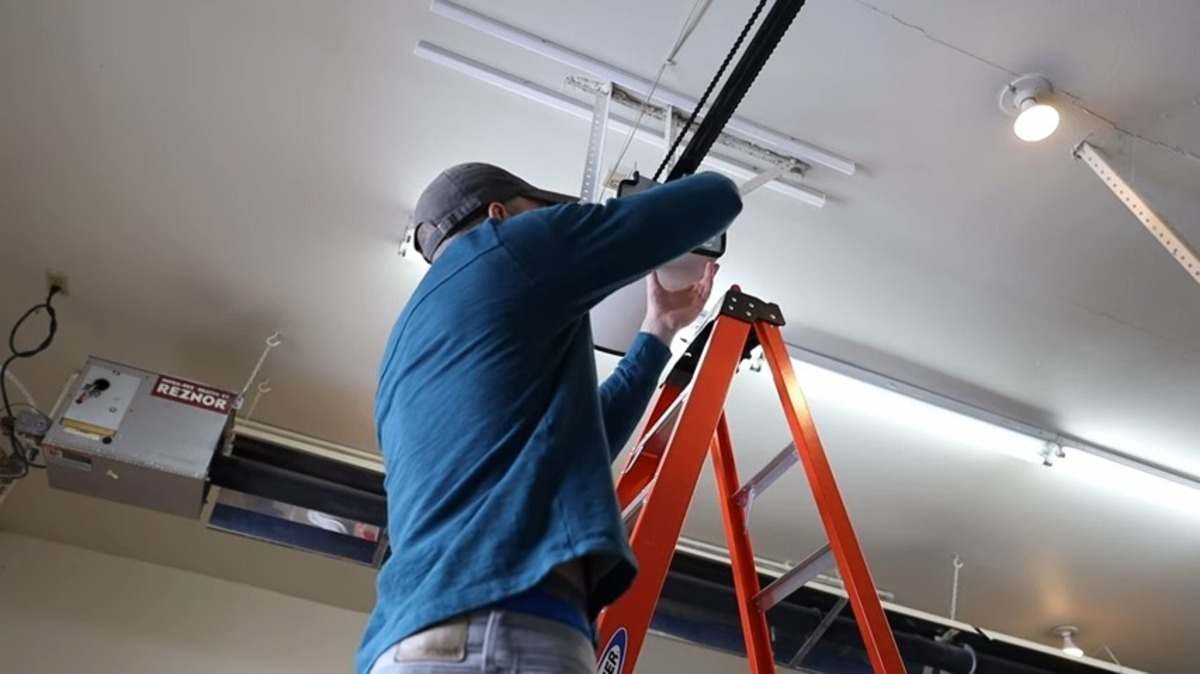Affiliate Disclosure: We may earn money or products from the companies mentioned in this post.
In today’s modern world, many rely on remote-controlled garage door openers for convenient and easy access to their homes. However, with the widespread adoption of LED light bulbs, some homeowners have reported issues with their garage door openers not functioning properly. This has led to questions about whether LED light bulbs can interfere with garage door openers.
Some LED light bulbs can produce EMI that can interfere with garage door openers, while others may not. The interference can also depend on the type of garage door opener, the frequency range it operates on, and the proximity of the LED light bulb to the opener.
How can I tell if my LED light bulb is interfering with my garage door opener?
Perhaps you’ve noticed that it doesn’t work as smoothly as it used to, or maybe it doesn’t respond to your remote control as quickly as it should. If so, you might wonder if your LED light bulb is causing interference with your garage door opener.
Fortunately, there are several ways to determine if this is the case. In this blog post, we’ll explore some of the signs that your LED light bulb is interfering with your garage door opener and what you can do to fix the problem.
First, let’s look at how LED light bulbs work. Unlike traditional incandescent bulbs, LED bulbs use electronic components to produce light. These components can create electromagnetic interference (EMI) that can disrupt the operation of other electronic devices, including garage door openers.
One of the most obvious signs that your LED light bulb is interfering with your garage door opener is if the opener doesn’t work when the light is turned on. If you’ve noticed that your garage door opener responds slowly or not at all when you activate it while the light is on, the EMI from the LED bulb may be disrupting the signal.
Another sign of interference is if the garage door opener works intermittently or only from a short distance. If you’ve noticed that the opener only works from a few feet away or when you’re standing in a certain spot, this could be a sign that the EMI from the LED bulb is causing problems.
You may also notice that the LED bulb flickers or dims when you activate the garage door opener. This is a common sign of EMI, indicating that the LED bulb interferes with the radio signal the opener uses to communicate with the remote control.
Products Recommendations
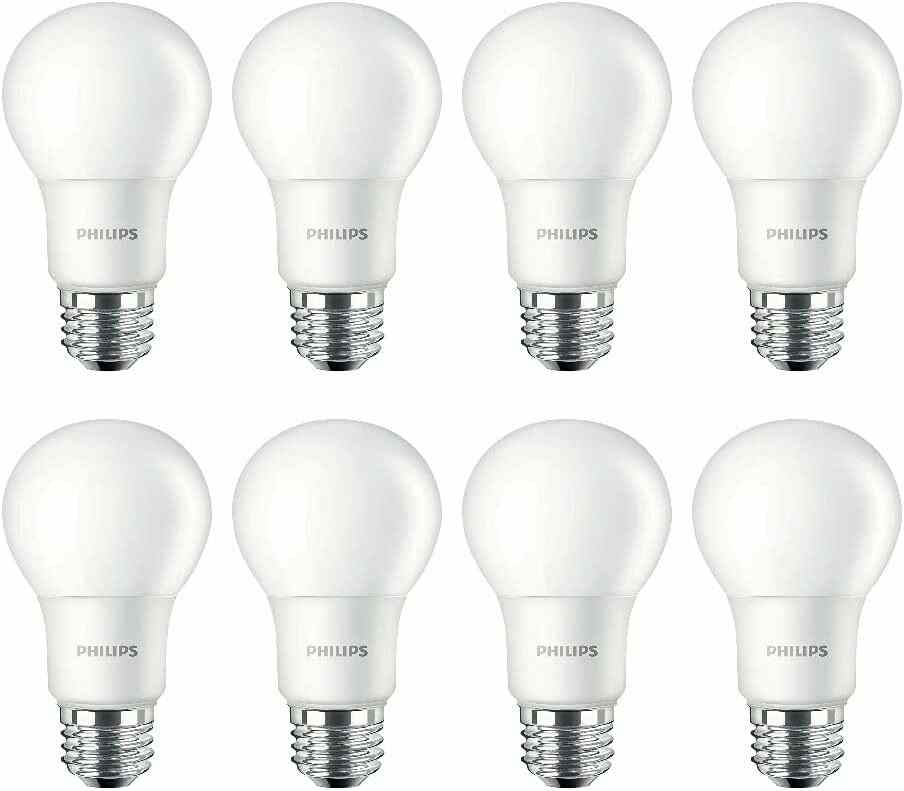
Philips LED Non-Dimmable A19 Frosted Light Bulb
This bulb emits soft white light.
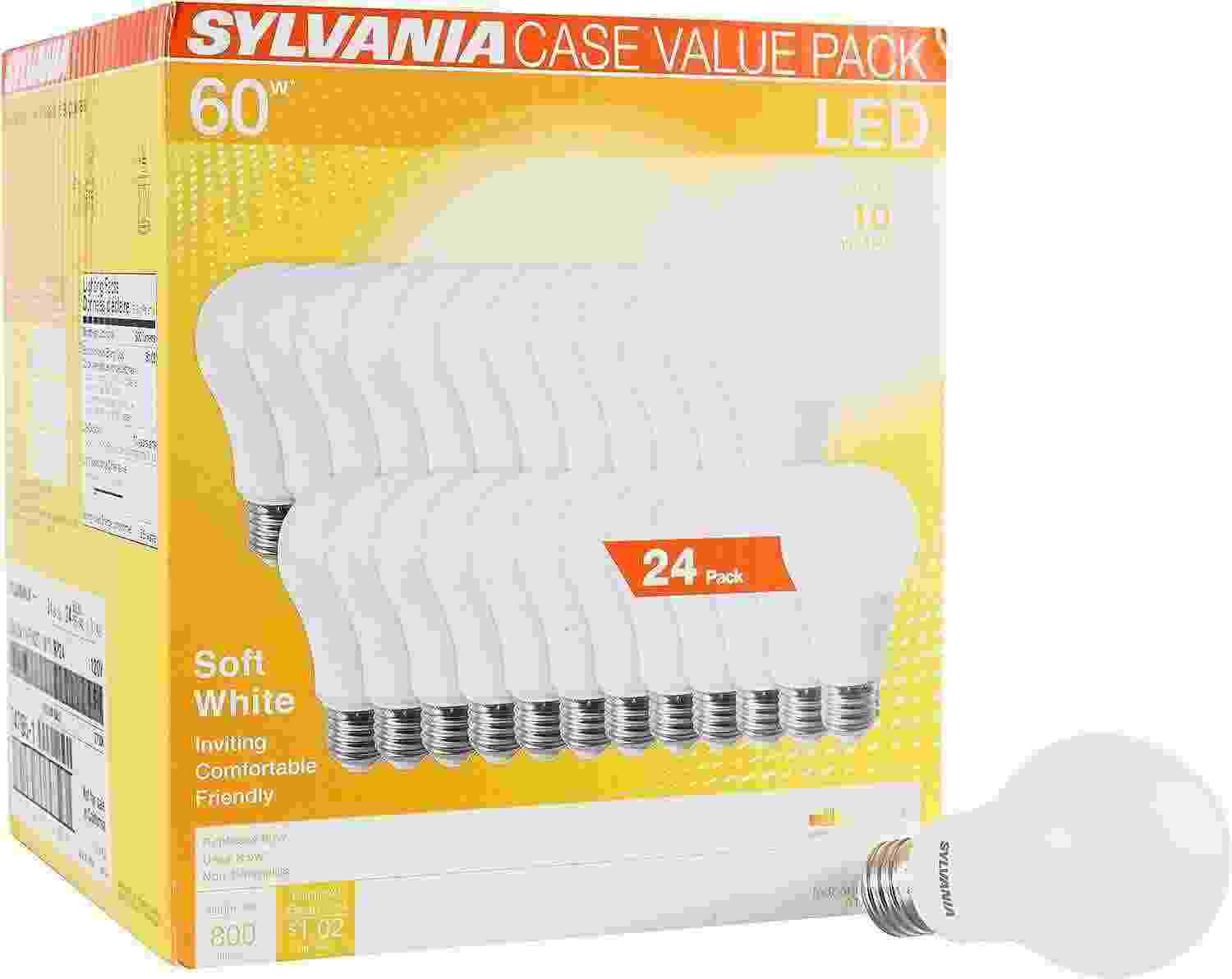
Sylvania Home Lighting 74765 A19
Known for its compatibility with various garage door opener systems.
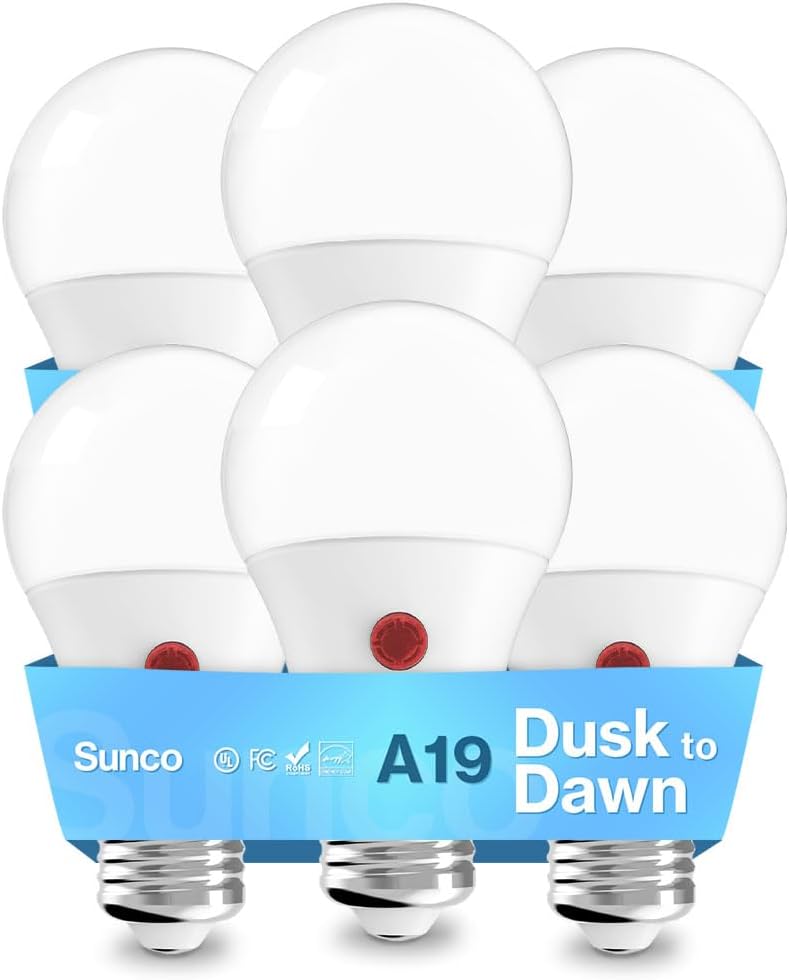
Sunco Lighting A19 LED Bulb
Soft white light and is engineered not to interfere with garage door opener signals.
How can I fix the interference between my LED light bulbs and garage door opener?
LED bulbs work differently from traditional incandescent bulbs, using electronic components to control their brightness. These components can emit radio frequency (RF) noise, interfering with the signal sent between the garage door opener and the remote control.
To fix this issue, there are several things you can try:
1. Replace your LED light bulbs with traditional incandescent bulbs
This is the most straightforward solution. Traditional incandescent bulbs do not emit RF noise and are less likely to interfere with your garage door opener.
However, incandescent bulbs are less energy-efficient and have a shorter lifespan than LED bulbs.
2. Use LED bulbs that are specifically designed to be garage door opener-compatible
Several manufacturers produce LED bulbs designed to be compatible with garage door openers. These bulbs are designed to emit lower levels of RF noise and are less likely to cause interference.
Check the packaging or the manufacturer’s website to see if the LED bulbs you are considering are garage door opener compatible.
3. Add a noise filter to your garage door opener
A noise filter is a device that can be added to your garage door opener to reduce the amount of RF noise it receives.
Noise filters can be purchased online or at your local hardware store. They are easy to install and can be a cost-effective solution to reduce interference.
4. Move your LED bulbs away from your garage door opener.
If your LED bulbs are too close to your garage door opener, they can cause interference. Try moving your bulbs away from the opener and see if this reduces the interference.
This solution may not be practical if you have limited space in your garage, but it is worth a try.
Are there any specific brands of LED light bulbs that do not interfere with garage door openers?
Not all LED bulbs will cause interference with garage door openers. Some brands have taken steps to reduce the amount of RF interference their bulbs emit. One such brand is Cree. Cree has developed a line of LED bulbs designed to be “garage door opener friendly.”
These bulbs have been tested and certified by the Chamberlain Group, a leading manufacturer of garage door openers, to be compatible with their products.
Cree’s bulbs use a unique filter to reduce the amount of RF interference they emit, making them a great choice for homeowners who want to use LED bulbs without worrying about interference with their garage door opener.
Another brand that is known for producing LED bulbs that are compatible with garage door openers is Sylvania. Sylvania’s LED bulbs have been tested and approved by the Chamberlain Group and Genie, another leading manufacturer of garage door openers. Their bulbs are also designed to emit lower levels of RF interference, making them a reliable option for homeowners.
Aside from Cree and Sylvania, other brands, such as Philips and Feit Electric, produce LED bulbs compatible with garage door openers. However, it’s important to note that not all bulbs from these brands may be garage door opener-friendly.
It’s best to check the packaging or research before purchasing any LED bulb to ensure it won’t interfere with your garage door opener.
Can interference from LED bulbs on my garage door opener cause damage over time?
In most cases, the interference from LED bulbs is unlikely to cause permanent damage to your garage door opener. However, it can cause the motor to wear out more quickly than it would otherwise. The increased strain on the motor can cause it to overheat, leading to premature failure.
Additionally, if the interference causes the door to operate improperly, it could put additional strain on the other components of the system, leading to wear and tear over time.
What other household devices can interfere with my garage door opener?
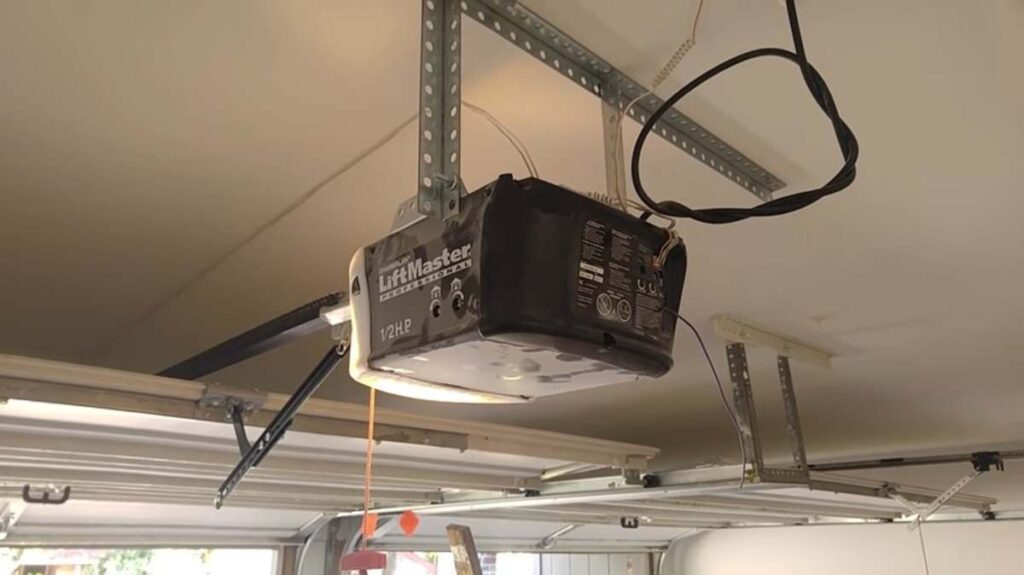
Many household devices can interfere with your garage door opener.
If you are experiencing interference, try moving the interfering device further away from your garage door opener or using a shielded cable to protect the signal from interference.
1. Wireless routers and other wireless devices
Wireless routers and other wireless devices are becoming increasingly common in modern homes. However, these devices operate on the same frequency as your garage door opener, which can cause interference. This interference can cause your garage door opener to malfunction or not work at all.
If you are experiencing issues with your garage door opener, try moving your wireless router or other wireless devices away from the opener to see if this improves the situation.
2. Cordless phones and baby monitors
Cordless phones and baby monitors also operate on the same frequency as your garage door opener, which can cause interference.
These devices can emit radio waves that disrupt the signal between your garage door opener and the remote control.
If you are experiencing interference from these devices, try using a different frequency for your cordless phone or baby monitor, or move them further away from your garage door opener.
3. Microwave ovens
Microwave ovens can also interfere with your garage door opener. This is because they emit a strong electromagnetic field that can disrupt the signal between your garage door opener and the remote control.
If you are experiencing interference from your microwave oven, try moving your garage door opener further away from the microwave or using a shielded cable to protect the signal from interference.
4. Power tools
Power tools can also cause interference with your garage door opener. This is because they can emit a strong electromagnetic field that can disrupt the signal between your garage door opener and the remote control.
If you are experiencing interference from power tools, try using them further away from your garage door opener or a shielded cable to protect the signal from interference.
What Type of lighting is best for the garage?
A well-lit garage not only enhances visibility but also helps prevent accidents and makes it easier to find the necessary tools and equipment.
However, with so many different types of lighting available, it can be challenging to determine what type of lighting is best for your garage.
1. LED Lights
LED lights have become increasingly popular in recent years and for a good reason. They are energy-efficient, long-lasting, and emit bright, clear light.
LED lights are also available in a variety of styles and sizes, making them a versatile option for garage lighting.
LED lights are easy to install and maintain and are suitable for use in both residential and commercial garages.
2. Fluorescent Lights
Fluorescent lights are a classic choice for garage lighting. They are energy-efficient, affordable, and emit a bright, even light that is easy on the eyes.
Fluorescent lights come in different sizes and can be hung from the ceiling or mounted on the wall. They are easy to install and require minimal maintenance.
3. Halogen Lights
Halogen lights are another option for garage lighting. They emit a bright, intense light that is perfect for illuminating dark areas.
Halogen lights are also energy-efficient and long-lasting, making them a good choice for garage lighting.
4. Motion Sensor Lights
If you want to save energy and reduce your electricity bill, motion sensor lights may be the way to go.
Motion sensor lights turn on automatically when someone enters the garage and turn off after a certain amount of time, so you don’t have to worry about leaving the lights on when you’re not in the garage.
Motion sensor lights are available in LED, fluorescent, and halogen varieties, so you can choose the one that works best for your needs.
5. Natural Light
If your garage has windows or skylights, natural light can be an excellent option for lighting your garage. Natural light is free, energy-efficient, and provides a more accurate representation of colours than artificial light.
However, natural light is not always consistent, and it may not be sufficient for working in your garage during nighttime hours.
Conclusion
LED light bulbs can potentially interfere with garage door openers, but the likelihood of interference is low. While it is important to consider the frequency and compatibility of your garage door opener and LED light bulb, most modern garage door openers are designed to operate on a frequency unaffected by LED light bulbs.
If you do experience interference with your garage door opener, there are several steps you can take to mitigate the problem. These include replacing your LED light bulbs with a different brand or type, installing a filter on your garage door opener, or moving the location of your LED light bulbs away from the garage door opener.

